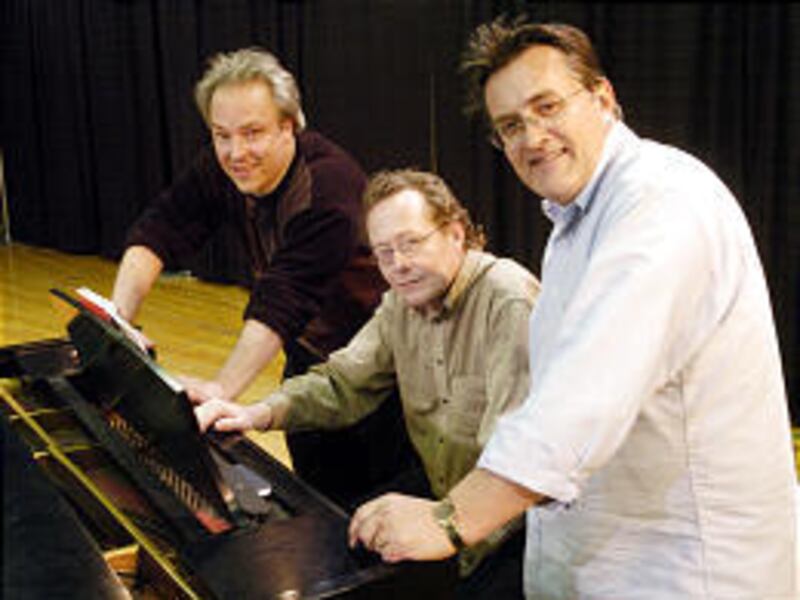Opera holds a central place in Bedrich Smetana's oeuvre, but today the Czech composer's works for the stage have been all but forgotten. Even "The Bartered Bride," the most popular and arguably the greatest of his eight operas, is seldom performed (although there are about a half-dozen recordings available).
Smetana, whose creativity and originality towered above that of his contemporaries, is considered the father of Czech nationalism. And for him, opera was the perfect medium in which to give voice to his nationalist pride. So it's a bitter irony that Smetana is today remembered primarily for his tone poem "The Moldau" and for his String Quartet in E minor, "From My Life."
Among his operas, only "The Bartered Bride" has stood the test of time. And despite occasional revivals at the MET and in western Europe, the work is best known for its overture and the Act III "Dance of the Comedians."
" 'The Bartered Bride' was an incredibly popular opera, but it fell out of rotation here in the U.S.," said Robert Breault. "I can't think of a single time it's been done here, at least recently."
Breault said that's not the case in Europe. "In England it's still in the repertoire. Jon Vickers made his Covent Garden debut with it as Vasek."
Local audiences will get a rare chance to see Smetana's 1866 opera when the University of Utah's Lyric Opera Ensemble performs it next weekend in Kingsbury Hall. Breault, who directs the ensemble, said that "The Bartered Bride" is a special treat. "For the audience, this will be a wonderful, wonderful opportunity to be enchanted by the music. It's so energetic, rhythmic and earthy. There is a lot of dance in it, and I think people will just love it."
The plot of Smetana's comic opera is simple, dealing as it does with a girl who is caught in the web of an arranged marriage. But through a series of clever ploys, she eventually succeeds in becoming engaged to the man she loves while still managing to uphold the letter of the marriage contract. The story is not an unfamiliar one in opera, but thanks to Smetana's creative genius, it becomes a masterpiece of characterization.
Breault said he decided to stage "The Bartered Bride" because he wants to expose local opera lovers to a wider spectrum of works. "The role of a university is to introduce the community to something new. I don't want to present operas that Utah Opera has done in the last five years. I want to do something different.
"And besides, I think audiences want to hear new things. That's why we've done operas like (Otto Nicolai's) 'The Merry Wives of Windsor,' which is another great opera that's not in rotation anymore."
The fact that Smetana's opera is seldom performed today should make it attractive to audiences, said Breault. "We know how operas like 'Tosca' and 'La Boheme' will end, because we've seen them so many times. The appeal they still have for us is that we want to see how they'll be presented. But with an opera like 'The Bartered Bride,' you live it, because you're experiencing it for the first time. You can read the synopsis in the program, of course, but you don't know the opera — you don't know how it will play out."
This production is also a collaborative effort. "We have people from throughout the college of fine arts involved," said Breault. "The last time we collaborated was with 'Godspell,' and that was very successful." Larry West, from the theater department, is the stage director. "Larry hasn't done a lot of operas. He comes from straight theater, but I think it's good to have someone from outside the box — he can add a different perspective."
Since Mozart's "Cosi fan tutti" in 1999, when Lyric Opera Ensemble began presenting operas every year, it's become increasingly difficult to cast parts because of the sheer number of gifted singers at the U. "It's a very difficult decision process," Breault said. "We cast them as professional operas by matching up the best singers for each role."
Unlike five years ago, auditions have become daylong affairs. "It used to be that the auditions would be from 4 to 6 p.m., and we would have our decision by 6:10," said Breault. "Now the auditions take six or seven hours."
He said the public will be impressed by the talent and professionalism of the singers. "I've had people come up to me after a performance and say, 'As far as I'm concerned, they're as good as professionals.' And I tell them that these productions give the audience a chance to see these singers when they first start out, before they make it big."
One of Breault's students, soprano Celena Shafer, had her first major role in "Cosi fan tutti" in 1999. Since then, her career has taken flight. Shafer returned to Salt Lake City a few years ago to shine as Adele in Utah Opera's otherwise forgettable production of Johann Strauss' "Die Fledermaus." She also recently made her debut with the New York Philharmonic, and this summer Shafer will sing the role of Hero in Berlioz's "Beatrice et Benedict" at the Santa Fe Opera.
Breault is thrilled with this production of "The Bartered Bride." "The students come to the production with so much energy and joy. And there is an amazing synergy with the student orchestra, their class A conductor (Robert Baldwin) and our world-class singers. And all of our technical people and creative people have been wonderful.
"It's hard to imagine finding anything of this collaborative size elsewhere. It's a wonderful gift to the community."
If you go . . .
What: "The Bartered Bride," Lyric Opera Ensemble, University of Utah
Where: Kingsbury Hall
When: Friday and
Saturday, 7:30 p.m.
How much: $10-$15
Phone: 581-7100, 355-2787 or 1-800-451-2787
Web:www.arttix.org
E-mail: ereichel@desnews.com



